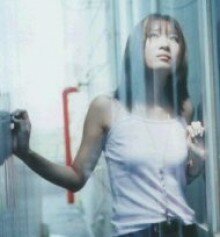
The rapid growth of the internet in China over the last five years has given rise to a flourishing alternative literary scene. In contrast to the intricate editorial control of conventional print media, net publication is often relatively unconstrained and open to new voices. Shuijing Zhulian, our new poet of the quarter, was still a high-school student of 16 when she first achieved recognition in China for her internet fiction, a reputation she has since consolidated with a published novel and, most recently, an acclaimed collection of poetry.
As in the West, the production and packaging of new literary personalities has emerged in recent years as a conspicuous fashion in the publishing industry. The trend goes back to the Shanghai writer Wei Hui, who achieved a highly profitable “notoriety” in 2000 when her Shanghai Baby was banned by the authorities. Since then, others have followed in her footsteps, including the author of Candy, Mian Mian, and Chun Shu, who managed a certain scandalous success with Beijing Doll, a volume of “punk memoirs”. In a sense, Shuijing is another product on this assembly-line and flaunts similar trademarks: youthful angst, sexual precociousness, happy-go-lucky cynicism. Nevertheless, despite her lolly-pop hedonism, there is much to like about her poetry.
“Shuijing Zhulian" is the pen-name of Chen Huan, a young woman from the northern city of Handan. Her pen-name was inspired by some lines from a song by the well-known pop-singer Hou Dejian: "Bring your crystal chain [shuijing zhulian]/And come with me...”. According to several reports, she displayed an interest in literature from a very early age. As one family story has it, she wrote a letter to the famous poet Feng Zhi (a writer of sonnets and translator of German poetry) when still only 8 years old, claiming to have found a mis-written character in one of his poems. Feng Zhi graciously replied, defended his use of the character in question, and invited the young critic to visit him in Beijing, an invitation she happily accepted.
Shuijing began posting her fiction and essays on the internet in 1999, and rapidly established a reputation with pieces such as “The Sound Incident”, “False Angel” and “Made in China”. At the age of 16, she began work on a novel called The Weeping Tung Tree (Kuqi de wutong). On the verge of publication in a series for young readers, the novel was withdrawn by publishers at the last moment on the grounds that its content could have been considered “unsuitable” (the book includes an account of a love affair between a teacher and a student). The novel was later published by the prestigious Writers Press.
Her latest collection, a blend of of poetry and prose, is entitled Just Gotta Be Gorgeous (Pianyao zuo meinü), and in it—like Wei Hui before her—Shuijing walks that fine line between ironical provocation and the effort to push a little at the uncertainties of contemporary being. Her language is generally minimalist. There’s little punctuation, infrequent insistence on the powers of rhythm, a persistent plainness of diction, a pervasive avoidance of poetic “ornament” (you’ll be hard pressed to find any simile or metaphor).
A pre-occupation with “the secrets of the bedroom”—love, lust and the whirl of the emotions—is prominent in much of her work and forms a stark contrast to the work of young male poets already featured on this site such as Sheng Xing. “Envy” is a typical example:
I notice certain endless-eternal things:
heavens, oceans, grasslands, grass-eating creatures
lacking—with love—even the slightest connection
endless-eternal innocence, appetites
making them careless of heart-break
In other poems, however, this more conventional strain is accompanied by the “in-your-face” sexual knowingness of poems such as “Report before Leaving”:
I am gradually spitting out my love for you
from morning to morning from sofa to sofa
just like those blood-flecked ejaculations
I so much admired. and after that lethargy
and hysteria. darling
You might wonder whether Shuijing is confusing explicitness with directness here, and prefers too readily the thrill of the shock over enhanced comprehension. Elsewhere, the urge to confront is tempered by an interest in the puzzles of experience. Without solemnity, she is capable of coming to grips with the oddities of human existence in short, idiosyncratic texts represented by "In Memory of Some Trees":
several trees
faraway
enough to make me feel quite flattered
in big cities there’s no comparable distance
in big cities my viewpoint’s sealed off between
insteps and the eyeballs’ inspections
right now
I must go all out to spy further trees
their calm and serenest greening
passionate greening
brings me—teasingly—good-natured laughter: Look here, you
confident city slicker
Please let go the beasts stowed in your point of view . . .
The lightness of touch displayed here is admirable, I think. In the “calm and serene greening” of the trees, the poet gets a hint of her own limitations and, by trying to see her own predicament from the perspective of these citizens of nature, attempts to win for herself—and for us, her readers—a less self-centred (and erotically tortured) mode of experience.
The Queensland Government, through Arts Queensland, has provided $5000 to Simon Patton and Poetry International Foundation for the China domain of Poetry International Web.
I would like to acknowledge Asialink for their generous award of a 3-month residency. This allowed me to spend time in Beijing in 2003 in the course of which early drafts of Shuijing’s poetry were completed. This residency was supported by the Australia Council and Arts Queensland.
Bibliography
The Weeping Tung Tree (novel, 1999)
Just Gotta Be Gorgeous (prose and poems, 2001)
Email Interview
Following Where Your Own Grain Runs: Eight Questions for Shuijing Zhulian







